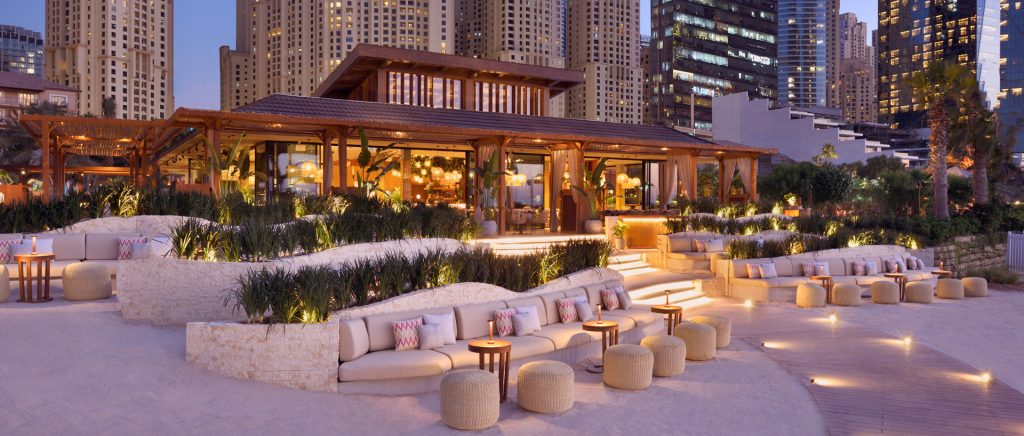It might surprise many, but Dubai’s culinary map includes vibrant pockets of the Caribbean—where flavors like scotch bonnet, allspice, plantains, and coconut milk find a home far from their tropical origin. Caribbean restaurants in Dubai aren’t widespread, but those that do exist stand out with distinct menus, rhythmic energy, and a sense of home for many expats from Jamaica, Trinidad, Barbados, and beyond. From small cafés tucked into JLT to resort restaurants that blend island aesthetics with Emirati hospitality, these places bring the Caribbean to the Gulf one plate at a time.
Most Caribbean spots are concentrated in lifestyle districts like JLT and Al Quoz
If you’re looking for authentic Caribbean food in Dubai, areas like Jumeirah Lakes Towers (JLT) and Al Quoz are a good start. JLT, with its international residential towers, is home to several independent eateries catering to niche communities. You might come across a spot serving Jamaican patties with sorrel juice or Trinidadian doubles in a small, cozy setting. Al Quoz, known for its artsy and experimental vibe, hosts a few hybrid concepts that fuse Caribbean staples with wellness menus—think jerk jackfruit tacos or callaloo-stuffed pastries. These venues often reflect the creativity and cultural pride of their owners.
Look out for weekend specials and live music nights
Many Caribbean restaurants in Dubai operate with limited weekday hours but come alive on weekends. Some offer buffet-style spreads or rotating specials that highlight lesser-known dishes like curried goat, pelau, or ackee and saltfish. Saturdays and Sundays are especially popular for brunches, sometimes accompanied by reggae or soca music. You may even find DJs playing vinyl while diners enjoy coconut bread and fried dumplings. These aren’t just meals—they’re small cultural gatherings. If you’re visiting, it’s worth calling ahead to ask about live events or special dishes available on certain days.
Menus often blend traditional recipes with local sourcing and halal preparation
Due to Dubai’s halal food regulations, many Caribbean restaurants adapt recipes while maintaining authenticity. Pork-based items may be replaced with lamb or chicken, and alcohol-based marinades are modified to comply with local laws. Despite these changes, the heart of the cuisine remains intact—rich stews, smoked meats, spiced rice, and tropical sides. You’ll often see halal-certified signage or speak with chefs who explain how they’ve balanced flavor and compliance. These adaptations not only respect local customs but also allow wider audiences to explore Caribbean cuisine with confidence.
Caribbean cafés in Dubai often serve imported beverages and specialty ingredients
Many Caribbean eateries source ingredients directly from the islands or from specialty distributors across the Gulf. This includes canned ackee, scotch bonnet peppers, breadfruit, and island spices that aren’t readily available in local supermarkets. Beverages like Mauby, Ting, and Caribbean-style ginger beer are common in coolers and are offered as signature drinks. Some venues also stock island condiments like pepper sauces and spice rubs for purchase. These small details create a sense of authenticity, allowing both Caribbean nationals and curious foodies to taste something close to home—or something entirely new.

You might find hidden gems in community events and expat-led pop-ups
Beyond brick-and-mortar restaurants, Caribbean cuisine sometimes appears at cultural festivals, food truck events, or private supper clubs. These pop-ups are usually promoted through Caribbean expat communities, especially around UAE National Day or international food markets. You might stumble upon a stand selling fried plantains and jerk wings at a beachside market in JBR or a cultural day hosted by Caribbean embassies. These events offer limited menus but high-energy atmosphere. Many small food entrepreneurs use them as testing grounds before opening full-scale restaurants or joining delivery platforms.
Expect to see Caribbean fusion appearing in larger hotel menus
Several high-end hotels and resorts in Dubai have started including Caribbean-inspired dishes in their global menus. While these aren’t always prepared by Caribbean chefs, the influence is unmistakable—jerk chicken skewers, island-style slaws, or coconut rice appear alongside Latin and Asian items. These dishes usually cater to hotel guests looking for new tastes and are crafted with presentation and dietary preferences in mind. Resorts near Palm Jumeirah or Business Bay are more likely to experiment with Caribbean elements during themed nights or culinary promotions, especially when Caribbean tourism boards collaborate with hospitality brands.
Some restaurants double as dance venues or host Caribbean cooking classes
A few venues push the experience beyond the plate. It’s not uncommon to find Caribbean restaurants in Dubai organizing soca dance nights, steelpan performances, or cooking workshops. These sessions attract a wide demographic—from seasoned food lovers to newcomers interested in Caribbean rhythm and culture. Some restaurants even partner with wellness retreats to offer Caribbean meals after fitness classes or beach clean-ups. This community-building approach adds depth to the dining experience and highlights how food, music, and tradition are inseparable in Caribbean culture.
Reservations are encouraged, especially for dinner service and events
Because Caribbean restaurants in Dubai are relatively few, tables fill up quickly—particularly on weekends and public holidays. Some operate by reservation only for themed nights, while others offer limited seating due to their small, home-style setups. To avoid disappointment, call or message ahead. Many venues also share their weekly menus or event plans via WhatsApp broadcasts or Instagram stories, so staying connected digitally helps you plan smarter. If you’re visiting during a Caribbean national holiday, expect special menus and increased crowds.
Caribbean food in Dubai is rooted in identity, celebration, and comfort
Dubai’s Caribbean restaurants aren’t just about spice—they’re about memory, joy, and belonging. Each dish reflects layered histories and vibrant diasporas. Whether you’re tucking into a flaky beef patty in a café near Al Quoz or sipping cold sorrel under palm lights in JLT, you’re participating in something deeper than just a meal. You’re tasting stories passed down through migration, tradition, and adaptation.
This article was created by the editorial team at www.few.ae.
